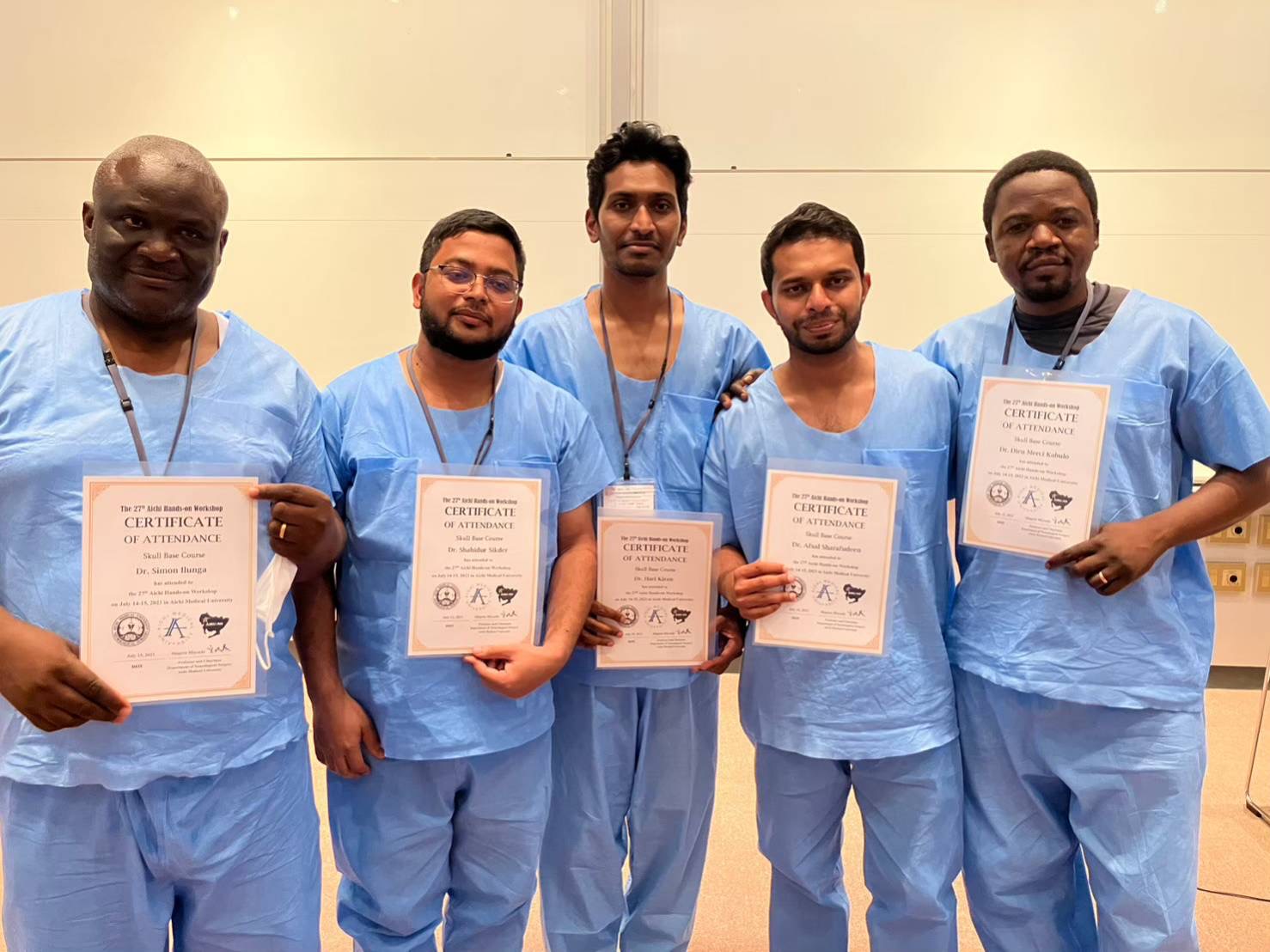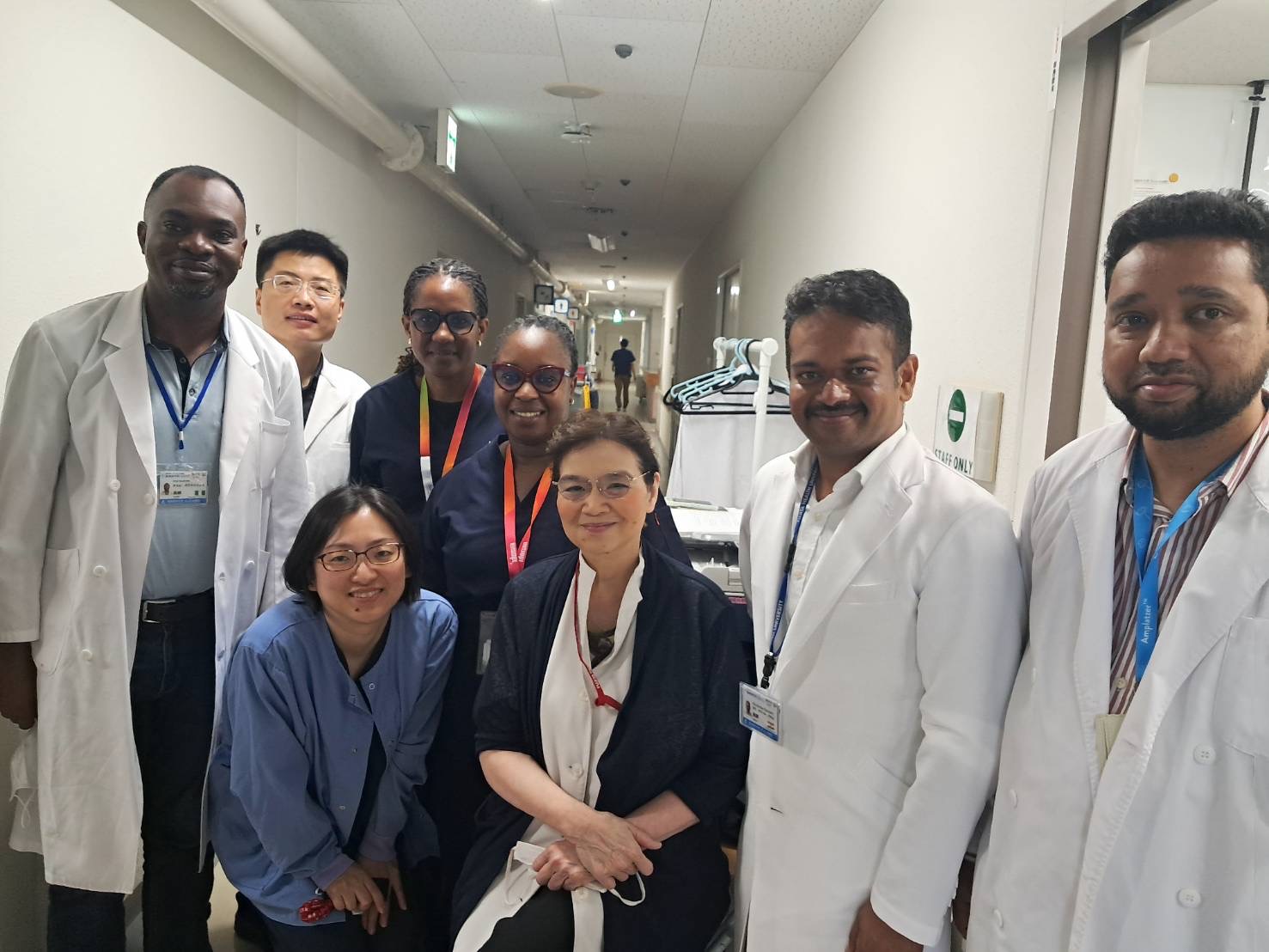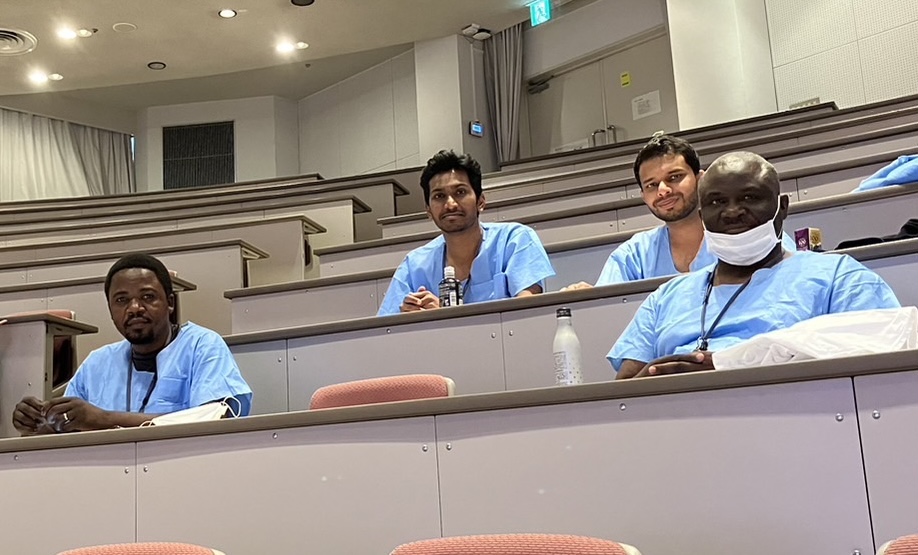Clinical Fellowship Program
WFNS Post-Graduate Training Center
Guideline for Neurosurgical Fellowship in Department of Neurosurgery, Fujita Health University Banbuntane Hotokukai Hospital, Nagoya, Japan.
Name of the Course: Advance training in Neurosurgery, Fujita Health University Banbuntane Hotokukai Hospital
Purpose: Neurosurgeon from aboard or Japan who would like to train in the advance technique of neurosurgery
Duration: 1 month, 2months
Director course: Professor Yoko Kato; Head of Department of neurosurgery, Fujita Health University, Banbuntane Hotokukai Hospital, Nagoya, Japan
Name of the Course: Advance training in Neurosurgery, Fujita Health University Banbuntane Hotokukai Hospital
Purpose: Neurosurgeon from aboard or Japan who would like to train in the advance technique of neurosurgery
Duration: 1 month, 2months
Director course: Professor Yoko Kato; Head of Department of neurosurgery, Fujita Health University, Banbuntane Hotokukai Hospital, Nagoya, Japan
Subspeciality
- Cerebrovascular Surgery: Aneurysm clipping, AVM Surgery, Microvascular decompression (Hemifacial spasm & Trigeminal neuralgia)
- Endovascular diagnosis and treatment: Embolisation of AVM and Aneurysm or Spinal vascular malformation
- Brain tumor : Glioma
- Spinal Surgery: Degenerative & Tumor
- Trauma
- Normal pressure hydrocephalus
- Endoscopic assisted cerebral blood clot removal
About the fellowship
- The fellowship is an observationship.
- For the morning conferences, the fellowship can discuss how to approach the surgery from the image and disease.
- Journal presentation will be assigned.
- End of the training. The fellowship will receive the certificated from our institute.
Daily activities
| 8:00-8:30 | 9:00-16:00 | 16:00-17:00 | |
| Monday | Pre & Post operative discussion | Research & Surgical practice learning | |
| Tuesday | Pre & Post operative discussion/ Journal club | Operation theater | |
| Wednesday | Pre & Post operative discussion | Operation theater | Academics conference |
| Thursday | Pre & Post operative discussion | Operation theater | |
| Friday | Pre & Post operative discussion/ Professor round | Research & Surgical practice learning | |
Accommodation
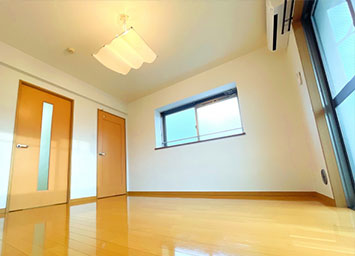
- The department will offer the apartment where located near the hospital (included the electricity and water).
- The convenience store and supermarket are nearby the hospital. The nearest train station is Otobashi next to Nagoya station.
- We will provide the scholarship for the fellowship during stay in Japan.
Application
Please take travel insurance absolutely when you come to Japan
and send the email to : neuron2@fujita-hu.ac.jp with
and send the email to : neuron2@fujita-hu.ac.jp with
- Recommendation letter
- CV with your face photo
- Copy of your license
Review from fellows
Dr. Sukirti Chauhan
Salute to the Doyen of Aneurysm Surgery:
A Delightful Learning Experience with Prof. Yoko Kato
My fellowship at the FHU Bantane Hospital under the mentorship of Prof. Yoko Kato has been nothing short of a unique and extraordinary learning experience. Mentoring under the “doyen of aneurysm surgery” is a once-in-a-lifetime experience for any neurosurgeon. This fellowship found me a student once again in order to become an even more confident surgeon, a thoughtful researcher, an able assistant, a leader, and a humble person who believes in team spirit.
The cerebrovascular part of the program included microneurosurgical work, skull base surgeries and neuroendovascular work. There are a variety of aneurysms which get clipped (eg. The IC-PC aneurysm, anterior choroidal artery aneurysm, multiple aneurysms, Pcom, Acom) and these happen almost every other day of the week. The list of cases is usually prepared the previous weekend. The fellows then refresh their anatomy before entering the OR. Each aneurysm is evaluated in detail – the position analysis, the blood flow, the stress on the wall of the aneurysm, the risk of rupture of aneurysm based on the thickness of the wall, the site of aneurysm which is most prone to rupture. These are part of CFD (computational fluid dynamics) and this hospital is one of the prime centers in the world for this. If the aneurysm is technically challenging for clipping due to its shape (fusiform M1-M2 bifurcation aneurysm) or location , you can watch the microvascular bypass surgery for such cases. The location of the superficial temporal artery is studied by 3D technology and re-created by software to get the best location of performing the bypass.
The neuroendovascular cases done here equip one to be a hybrid neurosurgeon. It is Prof. Kato’s vision that every cerebrovascular surgeon should be a hybrid surgeon – that they should be able to perform classical craniotomy, clipping of aneurysm and also do endovascular coiling and put flow diverters when required. The volume of cases in NET (Neuro-Endovascular Therapy) is so high that Dr. Prof. Tamura makes Digital Subtraction Angiography (DSA) look like cakewalk. She specializes in a distal radial artery approach and rarely the conventional femoral approach. After every DSA, the anatomy is studied carefully in the Neurocath lab and decisions are made on flow diverter/ coiling. There are lots of cases of DSA who are follow up after FD for aneurysms, and you will be convinced to see the results. Embolization of blood supply to the meningioma tumor is also another type of case you can see. In emergency cases, you can be lucky to see acute ischemic stroke requiring t-PA or thrombectomy.
Neuroendoscopy is another sub speciality which I got to observe here. Prof. Komatsu has one of the largest series of endoscopic microvascular decompression surgery for trigeminal neuralgia and hemifacial spasm. It is a privilege to learn from the masters of every speciality. The beautiful demonstration of intra-operative anatomy of the cerebello pontine angle on a huge high resolution television screen will blow your mind. Emergency cases of intracerebral hemorrhage are also done endoscopically.
The learning experience did not stop there. Prof. Yoko Kato ensured we have a wholesome neurosurgical experience. We are sent for rotation to other hospitals to learn the other nuances of our branch. The observership at Nagoya Central Hospital under Prof. Takebayashi Shinegori is for Functional Neurosurgery. Cases include deep brain stimulation for Parkinson’s Disease, Meige’s syndrome, and lesionectomy for dystonias. Nagoya Central Hospital is one of the best centers for Functional Neurosurgery in Japan and patients from all over the country are referred here. The Brain Suite is the operation room with intraoperative MRI (1.5T), neuromonitoring, intra-op X-ray machine which are all MRI compatible with the latest Leksell frames for stereotaxy. Dr. Takebayashi is assisted by Dr. Lushun Chalise and it is this team that teaches the fellows every step of the surgery.
Trans nasal trans sphenoidal endoscopic surgery for craniopharyngioma or pituitary is done by Dr. Takeuchi at the Nagoya Medical University Hospital. And whenever there is a case, Prof. Kato insists that we attend the surgeries there. We bike over there in our cycles, 15 mins each way to reach this hospital - a refreshing way for the mind and body for another learning experience.
There is a special microvascular anastomosis kit given to everyone when we started our fellowship. It consists of silicon vessels and 2 boxes (10 sutures each). The neurosurgery office staff room has 2 Leica microscopes, one exoscope with multiple sets of micro-instruments. You can practice microvascular anastomosis daily. When we send this suturing picture to Prof. Kato, she individually replies to all our emails. She reminded me of my loving nursery school teacher who loved to teach me from the basics.
This fellowship has made me realize that neurosurgery is not what happens in the operation room and textbooks. We need to live and feel alive as a neurosurgeon, and this feeling is beautifully clear to me from the Fujita experience. A neurosurgeon from any part of the world will find something new to learn here.
Prof. Yoko Kato is a Sensei , with an uncanny sixth sense. She understood us intuitively, and channeled our energies to bring out our best during the fellowship. Every student was different, and thus, special to her. She sent us to multiple conferences or workshops based on our interest and hosted wonderful dinners for us, from the welcome dinner, celebration dinner, to the farewell dinner. Whenever anyone from the FHU Bantane Hospital neurosurgery team attends any meeting or conference, they share their learning experience. Even Prof. Kato shared her experience and it made us understand her perspective. The neurosurgery office room had a warm welcome feeling with a desk allotted to you which made everyone feel that we are a part of the team.
Prof. Yoko Kato is a sensei in the truest sense. As a self-proclaimed princess of neurosurgery, I know I also have a long way to go. This experience has made me feel like I am wearing a gleaming crown. I hope to come back after a few years for another round of learning. I simply love being her student. Thank you, Prof.Kato!
The cerebrovascular part of the program included microneurosurgical work, skull base surgeries and neuroendovascular work. There are a variety of aneurysms which get clipped (eg. The IC-PC aneurysm, anterior choroidal artery aneurysm, multiple aneurysms, Pcom, Acom) and these happen almost every other day of the week. The list of cases is usually prepared the previous weekend. The fellows then refresh their anatomy before entering the OR. Each aneurysm is evaluated in detail – the position analysis, the blood flow, the stress on the wall of the aneurysm, the risk of rupture of aneurysm based on the thickness of the wall, the site of aneurysm which is most prone to rupture. These are part of CFD (computational fluid dynamics) and this hospital is one of the prime centers in the world for this. If the aneurysm is technically challenging for clipping due to its shape (fusiform M1-M2 bifurcation aneurysm) or location , you can watch the microvascular bypass surgery for such cases. The location of the superficial temporal artery is studied by 3D technology and re-created by software to get the best location of performing the bypass.
The neuroendovascular cases done here equip one to be a hybrid neurosurgeon. It is Prof. Kato’s vision that every cerebrovascular surgeon should be a hybrid surgeon – that they should be able to perform classical craniotomy, clipping of aneurysm and also do endovascular coiling and put flow diverters when required. The volume of cases in NET (Neuro-Endovascular Therapy) is so high that Dr. Prof. Tamura makes Digital Subtraction Angiography (DSA) look like cakewalk. She specializes in a distal radial artery approach and rarely the conventional femoral approach. After every DSA, the anatomy is studied carefully in the Neurocath lab and decisions are made on flow diverter/ coiling. There are lots of cases of DSA who are follow up after FD for aneurysms, and you will be convinced to see the results. Embolization of blood supply to the meningioma tumor is also another type of case you can see. In emergency cases, you can be lucky to see acute ischemic stroke requiring t-PA or thrombectomy.
Neuroendoscopy is another sub speciality which I got to observe here. Prof. Komatsu has one of the largest series of endoscopic microvascular decompression surgery for trigeminal neuralgia and hemifacial spasm. It is a privilege to learn from the masters of every speciality. The beautiful demonstration of intra-operative anatomy of the cerebello pontine angle on a huge high resolution television screen will blow your mind. Emergency cases of intracerebral hemorrhage are also done endoscopically.
The learning experience did not stop there. Prof. Yoko Kato ensured we have a wholesome neurosurgical experience. We are sent for rotation to other hospitals to learn the other nuances of our branch. The observership at Nagoya Central Hospital under Prof. Takebayashi Shinegori is for Functional Neurosurgery. Cases include deep brain stimulation for Parkinson’s Disease, Meige’s syndrome, and lesionectomy for dystonias. Nagoya Central Hospital is one of the best centers for Functional Neurosurgery in Japan and patients from all over the country are referred here. The Brain Suite is the operation room with intraoperative MRI (1.5T), neuromonitoring, intra-op X-ray machine which are all MRI compatible with the latest Leksell frames for stereotaxy. Dr. Takebayashi is assisted by Dr. Lushun Chalise and it is this team that teaches the fellows every step of the surgery.
Trans nasal trans sphenoidal endoscopic surgery for craniopharyngioma or pituitary is done by Dr. Takeuchi at the Nagoya Medical University Hospital. And whenever there is a case, Prof. Kato insists that we attend the surgeries there. We bike over there in our cycles, 15 mins each way to reach this hospital - a refreshing way for the mind and body for another learning experience.
There is a special microvascular anastomosis kit given to everyone when we started our fellowship. It consists of silicon vessels and 2 boxes (10 sutures each). The neurosurgery office staff room has 2 Leica microscopes, one exoscope with multiple sets of micro-instruments. You can practice microvascular anastomosis daily. When we send this suturing picture to Prof. Kato, she individually replies to all our emails. She reminded me of my loving nursery school teacher who loved to teach me from the basics.
This fellowship has made me realize that neurosurgery is not what happens in the operation room and textbooks. We need to live and feel alive as a neurosurgeon, and this feeling is beautifully clear to me from the Fujita experience. A neurosurgeon from any part of the world will find something new to learn here.
Prof. Yoko Kato is a Sensei , with an uncanny sixth sense. She understood us intuitively, and channeled our energies to bring out our best during the fellowship. Every student was different, and thus, special to her. She sent us to multiple conferences or workshops based on our interest and hosted wonderful dinners for us, from the welcome dinner, celebration dinner, to the farewell dinner. Whenever anyone from the FHU Bantane Hospital neurosurgery team attends any meeting or conference, they share their learning experience. Even Prof. Kato shared her experience and it made us understand her perspective. The neurosurgery office room had a warm welcome feeling with a desk allotted to you which made everyone feel that we are a part of the team.
Prof. Yoko Kato is a sensei in the truest sense. As a self-proclaimed princess of neurosurgery, I know I also have a long way to go. This experience has made me feel like I am wearing a gleaming crown. I hope to come back after a few years for another round of learning. I simply love being her student. Thank you, Prof.Kato!
Dr. Hari Kiran
Experience of Fellowship in Cerebrovascular surgery
Dr Hari Kiran from INDIA write this letter with great joy and pride that I have successfully finished my fellowship course in cerebrovascular surgery in July 2023 from Fujita university Bantane hospital under Prof. YOKO KATO.
From the very first day I arrived, I had great support from everyone in adapting to a new environment. People were friendly and always ready to help which is a great quality you don’t see in many countries. From providing accommodation, everyday bypass training, Morning case discussions, excellent surgeries to friendly dinners, this fellowship course is by far the best in the world.
Professor Kato has taken great effort to guide fellows and helping them in understanding the concepts of cerebrovascular surgery. All the teachers were very helpful with their constant guidance and support. Pre-surgery planning and discussions have helped a lot with how to plan for a surgery and how to do it independently.
I have studied specially in Computational fluid dynamics of aneurysms, application of it in Bypass, Cerebral vessel wall remodelling after bypass. I have learnt various skull base approaches from workshops and written two articles on Vascular dementia and Vertebral artery V3 segment anomalies which are for publishing.
My most memorable moments were practicing bypass every day and getting feedback from professor each time, visiting other universities and attending complex surgeries with experts in the field, attending two cadaver workshops, research discussions with co-fellows and writing two academic articles.
I take this opportunity to thank all the sensei who have taught me during surgeries, I thank all my co-fellows for sharing their ideas and for the fun time. Special thanks to Mr. Takanori for taking care of our problems from beginning to end. I am grateful to Professor Yoko Kato for this opportunity and accepting me as fellow. My deep respect for her tremendous effort in improving neurosurgical training and research. I look upon you and hope to follow your path and passion.
Though my fellowship is over, I plan to return to Fujita sometime in future for learning new things and to share knowledge.
From the very first day I arrived, I had great support from everyone in adapting to a new environment. People were friendly and always ready to help which is a great quality you don’t see in many countries. From providing accommodation, everyday bypass training, Morning case discussions, excellent surgeries to friendly dinners, this fellowship course is by far the best in the world.
Professor Kato has taken great effort to guide fellows and helping them in understanding the concepts of cerebrovascular surgery. All the teachers were very helpful with their constant guidance and support. Pre-surgery planning and discussions have helped a lot with how to plan for a surgery and how to do it independently.
I have studied specially in Computational fluid dynamics of aneurysms, application of it in Bypass, Cerebral vessel wall remodelling after bypass. I have learnt various skull base approaches from workshops and written two articles on Vascular dementia and Vertebral artery V3 segment anomalies which are for publishing.
My most memorable moments were practicing bypass every day and getting feedback from professor each time, visiting other universities and attending complex surgeries with experts in the field, attending two cadaver workshops, research discussions with co-fellows and writing two academic articles.
I take this opportunity to thank all the sensei who have taught me during surgeries, I thank all my co-fellows for sharing their ideas and for the fun time. Special thanks to Mr. Takanori for taking care of our problems from beginning to end. I am grateful to Professor Yoko Kato for this opportunity and accepting me as fellow. My deep respect for her tremendous effort in improving neurosurgical training and research. I look upon you and hope to follow your path and passion.
Though my fellowship is over, I plan to return to Fujita sometime in future for learning new things and to share knowledge.
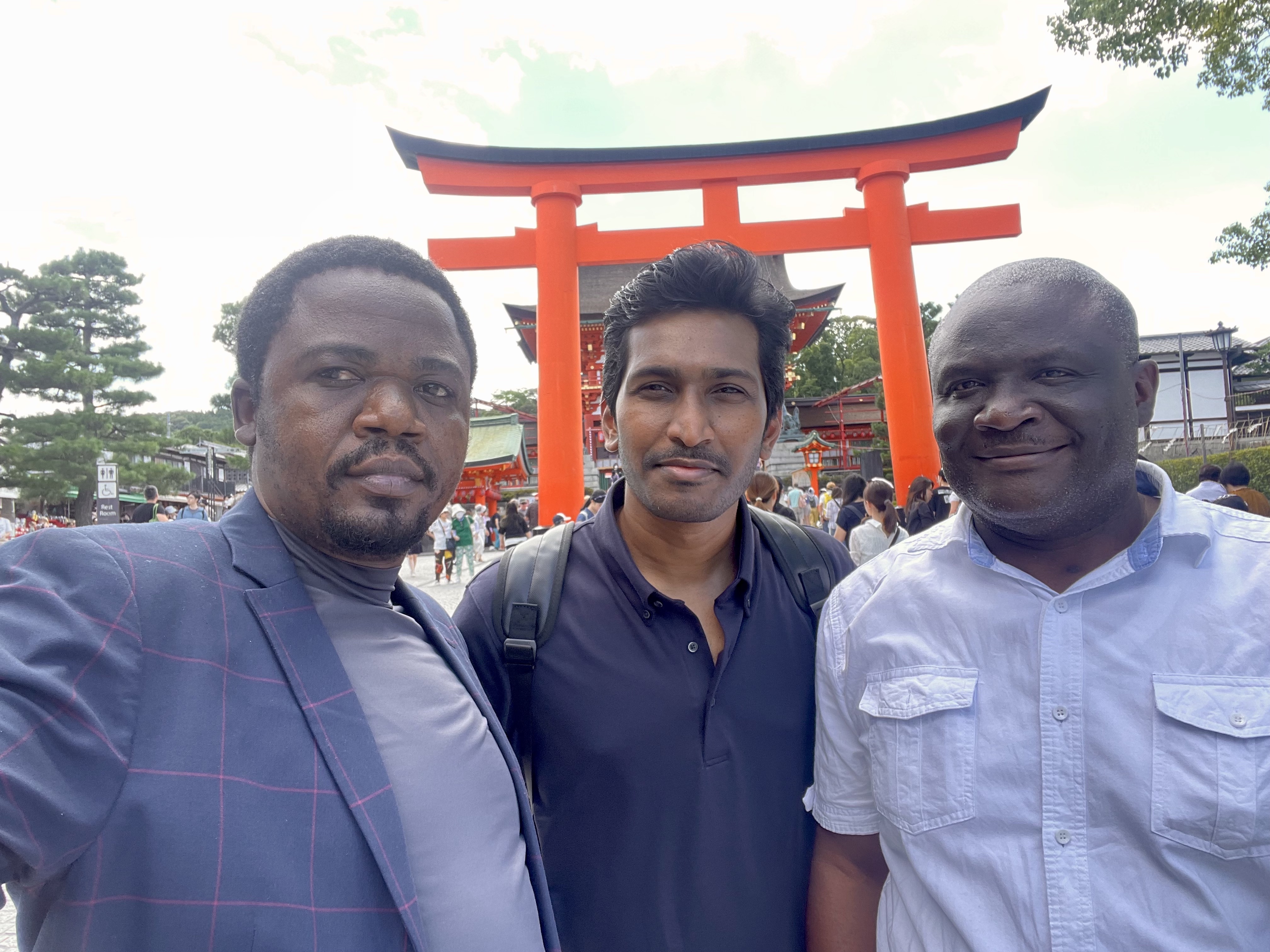
Trip to Kyoto
From the left Kabulo, Hari and Simon
Hands on cadaveric workshop on Skull Base approaches
at Aichi Medical University
From the left Kabulo, Hari, Afsal and Simon
Course consisted of two days of various skull base approaches and Extended endoscopic endonasal approach with cadaveric dissection and endoscopy by fellows under guidance from mentors.


